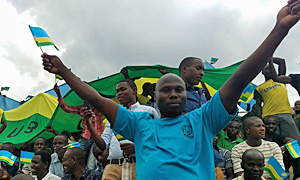SIT Students Participate in Weeklong Field Course in Rwanda
September 18th, 2017 | SIT Graduate Institute

In January, 15 SIT students participated in a weeklong field course on conflict transformation in Rwanda. The course gave these students the opportunity to gain a deeper understanding of the peacebuilding and reconciliation process in Rwanda following the 1994 genocide.
The field course in Rwanda has been running since 2005 as part of SIT’s CONTACT (Conflict Transformation Across Cultures) certificate program, which started in 2000. Beginning this year, the course opened to SIT’s MA students as well. The Rwanda field course is one of several graduate study abroad options offered by SIT. This January, SIT also offered intensive field courses in India; Jordan; Costa Rica; and Barbados, St. Vincent, and the Grenadines.
Students on the Rwanda field course spoke with political leaders, survivors of the genocide, second-generation youth, Gacaca judges, elders, and other Rwandans. They also assessed the effectiveness of a range of peacebuilding interventions within the country and discussed challenges and lessons learned with local practitioners. Throughout these visits and meetings, students were provided with frequent time for reflection, discussion, debriefing, and processing.
Before the students even landed in Rwanda, they had completed two weeks of distance learning to provide them with the historical and social context in which the genocide occurred. Once in-country, students received an orientation, in which they were introduced to Rwandan cultures and learned how to ask difficult questions and listen actively. They were also prepared for the emotionally taxing nature of these inquiries.
The course, led by SIT faculty Mehlaqa Samdani and Susie Belleci, aimed to answer the questions, What are the critical factors contributing to the emergence of genocide? What are some of the most critical challenges facing Rwandans as they attempt to come to terms with genocide and establish justice?
To do this, the course took students to a number of important locations, including:
- The Kigali Genocide Memorial (followed with a dialogue circle and a session in forgiveness practice)
- Save Village in Huye District, the location of a comprehensive community reconciliation project
- MEMOS, an organization that brings together genocide survivors with those who rescued them
- A meeting with Hirwa Hubert of the Rwandan Quakers trauma healing program (HROC: Healing and Rebuilding Our Communities) and with Fidele Rutayisire of RWAMREC (Rwanda Men’s Resource Center), an organization focused on mobilizing men as participants in the process of gender role transformation
- A meeting with ex-prisoners of TIG (Travaux d’Interet Generale), a nationwide community service program that was part of the judicial process
- Rwanda’s Parliament, for a meeting with the Women’s Forum for Parliamentarians and with MP (and CONTACT graduate) Edouard Bamporiki
- The parish of Pastor Antoine Rutayisire, who leads a multi-ethnic congregation, to witness his approach to community reconciliation

Through these visits and meetings, students were able to see some of the complexity of the country’s ongoing peacebuilding and reconciliation process. As Pastor Rutayisire told the group during their visit to his parish, “We have succeeded in creating peaceful cohabitation but we are still in the process of creating lasting reconciliation.”
The week in Rwanda was an experience that left a lasting impression on the students who participated in it.
Megan Grove, one of the students on the course, said,
This field course was a once-in-a-lifetime opportunity to learn from various sectors of a society recovering from and rebuilding after genocide. From survival stories to rescuer stories to stories of forgiveness in the face of unimaginable pain, this intense experience reminded me why I want to be engaged in the work of peacebuilding and reinforced my commitment to this field. Our meetings with Parliamentarians, NGOs, activists, and community groups provided a wide range of experiences and worldviews, reminding me that there are many truths and complexities that exist in every society, community, and individual and that no one entity has a claim on the truth.
CONTACT student JP Vargas said,
Throughout our week in Kigali we met with myriad human beings who have lived through situations that I find incomprehensible even on the most basic and whole levels of my being. We had talks with people who are living a life of forgiveness and compassion that shake me to the last tendons and fibers and sinews of my body.
CONTACT Director Dr. Bruce Dayton is considering other ways to get SIT MA students involved in a range of peacebuilding field experiences. According to Dayton, “The courses we teach on peacebuilding theory and practice at SIT are wonderful. But it’s the direct experiences in the field that make classroom insights come alive for students. To me that’s one of the most special things about the SIT Graduate Institute experience.”
